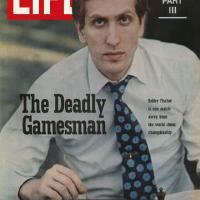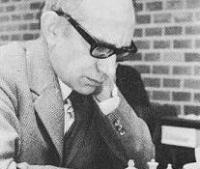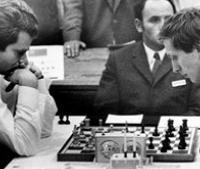
He Learned Directly from God, Part 5
The 1969 U.S. Championship was also a zonal qualifier, with the top three finishers advancing to the Interzonal. Fischer however, did not play, because of disagreements about the tournament's format and prize fund. Benko, one of the three qualifiers, agreed to give up his spot in the Interzonal in order to give Fischer another shot at the World Championship. Bobby won the event with 18.5 of 23, three and a half points more than the second place finisher. His dramatic march toward the title made him a household name, and he made chess, in front-page news for a time. In December 1970 his FIDE rating was 2740, and he won the chess Oscar for 1970, then again for 1971, and 1972.
In June 1971, Bobby Fischer defeated Mark Taimanov 6-0 in the Candidates quarterfinals, in Vancouver, Canada. Fischer wanted Larry Evans to be his second, but Evans refused when Fischer demanded that Evans abstain from any journalism and leave his wife back home.
Less than two months later, he astounded the chess world by beating Larsen in their match by the same score. Just a year before, Larsen had played first board for the Rest of the World team ahead of Fischer. Garry Kasparov later wrote that no World Champion had ever shown superiority over his rivals comparable to Fischer's "incredible" 12–0 score in these two matches. In August 1971, Fischer won a strong lightning event at the Manhattan Chess Club with a score of 21.5 of 22.
Only former World Champion Petrosian, Fischer's final opponent in the Candidates matches, was able to offer resistance in their match, played in Buenos Aires. Petrosian played a strong theoretical novelty in the first game, gaining the advantage, but Fischer played resourcefully and eventually won the game after Petrosian faltered. This gave Fischer an extraordinary run of 20 consecutive wins against the world's top players (in the Interzonal and Candidates matches). Petrosian won decisively in the second game, finally snapping Fischer's streak. After three consecutive draws, Fischer swept the next four games to win the match 6.5–2.5.
(this full game is analyzed here)
The final match victory allowed Fischer to challenge World Champion Boris Spassky, whom he had never beaten (+0 −3 =2). Soon after the Petrosian match Fischer appeared on the cover of Life. Fischer's amazing results gave him a far higher rating than any player in history up until that time. On the July 1972 FIDE rating list, his Elo rating of 2785 was 125 points ahead of Spassky, the second-highest rated player with 2660.
Before and during the match with Spassky in Reykjavik, for the World Championship, Fischer paid special attention to his physical training, which was a relatively novel approach for top chess players at that time. He had developed his tennis skills to a good level, and played frequently during off-days in Reykjavik. He also had arranged for exclusive use of his hotel's swimming pool during specified hours, and swam for extended periods, usually late at night.
Fischer lost the first two games, the first when he played a risky pawn-grab in a drawn endgame, the second by forfeit when he refused to play the game in a dispute over playing conditions. Fischer would likely have forfeited the entire match, but Spassky, not wanting to win by default, yielded to Fischer's demands to move the next game to a back room, away from the cameras whose presence had upset Fischer. After that game, the match was moved back to the stage and proceeded without further serious incident. Fischer won seven of the next 19 games, losing only one, and drawing eleven, to win the match 12.5–8.5 and become the 11th World Chess Champion. Fischer received $160,000 for his efforts and another $40,000 in royalties. President Nixon sent him a telegram congratulating him for his fine efforts. Fischer donated $61,200 of his winnings to the Worldwide Church of God. His FIDE rating was 2780. This would be his last FIDE rating.
The Cold War trappings made the match a media sensation. It was called "The Match of the Century," and received front-page media coverage in the United States and around the world. Fischer's win was an American victory in a field that Soviet players had dominated for the past quarter-century — players closely identified with, and subsidized by, the Soviet state. Dutch grandmaster Jan Timman calls Fischer's victory "the story of a lonely hero who overcomes an entire empire."
Fischer appeared on the cover of Sports Illustrated with American Olympic swimming champion Mark Spitz.
On April 3, 1975 Bobby Fischer forfeited his title as world Chess Champion to Anatoly Karpov, After the World Championship in 1972, Fischer virtually retired from chess: he did not play a competitive game in public for nearly 20 years.
In 1992 the Department of the Treasury ordered Bobby Fischer to stop his activities in the planning of a chess match in Yugoslavia. On September 1, 1992, Bobby Fischer came out of his 20 year retirement and gave a press conference in Yugoslavia. He pulled out an order from the U.S. Treasury Department warning him that he would be violating U.N. sanctions if he played chess in Yugoslavia. He spit on the order and now faces 10 years in prison and a $250,000 fine if he returns to the U.S. In addition, he must forfeit his $3.65 million to the U.S. Treasury and forfeit 10% of any match royalties earned. On September 30, Bobby Fischer began his re-match with Boris Spassky (ranked 99th in the world now) in Sveti Stefan (Montenegro), Yugoslavia. The match was organized by banker Jedzimir Vasiljevic. On November 11, Fischer won the match with 10 wins, 5 losses, and 15 draws. He received $3.65 million for his winnings and Spassky received $1.5 million. The match used the new Bobby Fischer chess clock.
On January 17, 2008, Bobby Fischer died from kidney failure in a Reykjavik hospital. He was 64.
As soon as he achieves a minimum advantage, he begins to play like a machine.
(Petrosian)
Fischer was always looking for the truth on the board.
(Spassky)
Fischer is a true fighter who always plays to win.
(Euwe)
.

